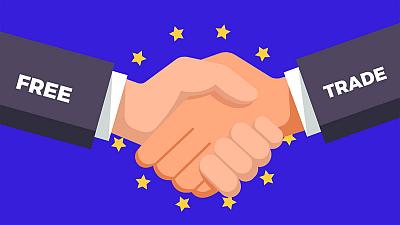The second lesson is the need for small victories to generate momentum, rather than going for big wins immediately— Peel's policy of "gradualism". His plan did not fully remove sliding-scale tariffs until 1849, giving time for landowners to adapt. Meanwhile, Britain's free-trade moves helped usher in a wave of trade agreements across Europe and with America.
第二個教訓(xùn)是,需要小的勝利來產(chǎn)生動力,而不是立即取得大的勝利——皮爾的“漸進主義”政策。他的計劃直到1849年才完全取消浮動關(guān)稅,給土地所有者時間來適應(yīng)。與此同時,英國的自由貿(mào)易舉措在歐洲和美國掀起了一波貿(mào)易協(xié)定浪潮。
The third lesson is the need for tangible benefits for the public. By 1850, people were paying around a quarter less for bread than if repeal had not occurred, according to Kevin O'Rourke of NYU Abu Dhabi. The real incomes of society's top 10% fell, while those of the bottom 90% grew slightly, notes Douglas Irwin of Dartmouth College.
第三個教訓(xùn)是,公眾需要切實的利益。據(jù)阿布扎比紐約大學(xué)的凱文·奧羅克稱,到1850年,人們購買面包的費用比廢除該法案之前減少了1/4。達特茅斯學(xué)院的道格拉斯·歐文指出,社會上收入最高的10%的人的實際收入下降了,而收入最低的90%的人的實際收入略有增長。

Much can be learned from Peel's approach. Today, free trade is promoted by stale policy wonks and rapacious executives, nothing like the broad, energetic coalition of the past. Opponents of globalisation use social media far more effectively than its supporters. Politicians vie for grand gestures rather than quiet incrementalism. And the benefits of free trade are largely hidden from consumers. Those who take to the ramparts to protest against globalisation fail to notice why their smartphones are so cheap.
我們可以從皮爾的方法中學(xué)到很多東西。如今,自由貿(mào)易與過去廣泛而積極的聯(lián)盟不同,相反是由陳腐的政策書呆子和貪婪的高管推動的。全球化的反對者比支持者更有效地利用了社交媒體。政客們爭奪的是大刀闊斧的姿態(tài),而不是安靜的漸進主義。自由貿(mào)易的好處在很大程度上被消費者所掩蓋。那些拿起壁壘來抗議全球化的人沒有注意到他們的智能手機為什么這么便宜。
Yet the most important lesson is about leadership. Peel had opposed repealing the Corn Laws but, faced with a crisis, he was willing to split his party and lose his job to do the right thing. The divided Conservatives rarely held power during the following 30 years. It was "the whole community" that mattered, Peel wrote in his memoirs, and whether "cheapness and plenty are not (better) ensured for the future" by free trade than by protectionism. What leader would be willing to do that today?
然而,最重要的教訓(xùn)是領(lǐng)導(dǎo)力方面。皮爾曾反對廢除《谷物法》,但在面臨危機時,為了做正確的事,他愿意分裂自己的政黨甚至丟掉自己的工作。在接下來的30年里分裂的保守黨很少掌權(quán)。皮爾在回憶錄中寫道,重要的是“整個社會”以及自由貿(mào)易是否能比保護主義“更好地保證未來的廉價和富足”。今天有哪個領(lǐng)導(dǎo)人愿意這樣做呢?
譯文由可可原創(chuàng),僅供學(xué)習(xí)交流使用,未經(jīng)許可請勿轉(zhuǎn)載。











